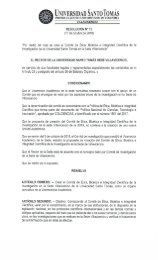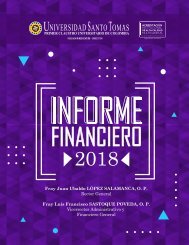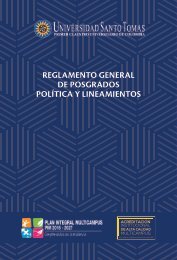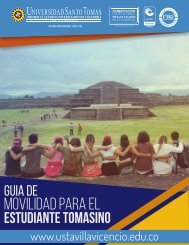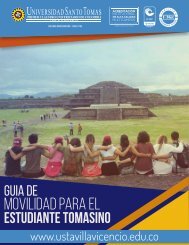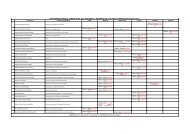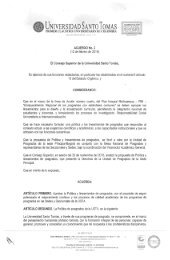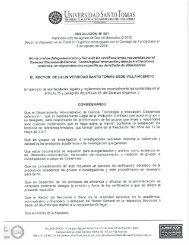USTA Speaks 8 Versión Final
Create successful ePaper yourself
Turn your PDF publications into a flip-book with our unique Google optimized e-Paper software.
<strong>USTA</strong> <strong>Speaks</strong><br />
Foreign Language Institute<br />
February-May, 2018<br />
Issue 8<br />
ENVIRONMENTAL PROBLEMS<br />
AND<br />
ALTERNATIVE ENERGIES<br />
environmental<br />
Proof Copy: Not optimized for high quality printing or digital distribution
ON THIS NEW ISSUE<br />
WHY ENVIRONMENTAL<br />
PROBLEMS AND<br />
ALTERNATIVE ENERGIES?<br />
Editor's message<br />
Page 1<br />
THE ENVIRONMENTAL<br />
IMPACT OF A<br />
PLANT BASED DIET<br />
Nadira Kajmova<br />
Page 2<br />
DECIDE TO LIVE<br />
OR<br />
CHOOSE TO DIE!<br />
Maria Reyes Beltrán<br />
Page 4<br />
TOXIC CLEANLINESS<br />
Iga Jechanowska<br />
Page 6<br />
HOW CAN WE SAVE<br />
THE WORLD<br />
DIFFERENTLY?<br />
Louisa Hall<br />
Page 8<br />
WHAT IS THE BIGGEST<br />
ENVIRONMENTAL PROBLEM<br />
IN COLOMBIA?<br />
Jefferson Díaz<br />
Page 11<br />
ENVIRONMENTAL LAW,<br />
A RIGHT OF EVERYONE!<br />
Ximena del Pilar<br />
Cortes Noguera<br />
Page 13<br />
DO YOURSELF A FAVOR<br />
AND<br />
SEPARATE YOUR TRASH!<br />
Katlein Spildooren<br />
Page 15<br />
OUR ENVIRONMENT, ITS<br />
PROBLEMS AND THE SOURCE<br />
OF ALTERNATIVE ENERGY<br />
Aneta Toborikova<br />
Page 17<br />
MOO-OVE OVER COWS!<br />
VEGETARIANISM<br />
AND<br />
THE ENVIRONMENT<br />
Marie Lilly<br />
Page 20<br />
CAPETOWN<br />
AND<br />
WHATEVER HAPPENED TO<br />
DAY ZERO<br />
Alexander Avellaneda<br />
Page 19<br />
Proof Copy: Not optimized for high quality printing or digital distribution
WHY ENVIRONMENTAL PROBLEMS<br />
AND ALTERNATIVE ENERGIES?<br />
EDITOR'S MESSAGE<br />
Dear colleagues, students, friends and readers<br />
On behalf of the Foreign Languages Institute of<br />
Santo Tomás University in Villavicencio I would<br />
like to welcome all of you to our latest issue of<br />
<strong>USTA</strong> <strong>Speaks</strong>.<br />
2018 gives us a chance for change and renovation,<br />
as you may have noticed, our image and the way<br />
we present the articles has been changed for a<br />
more reader-friendly structure and a lighter and<br />
more organised presentation. This will not only<br />
make us more attractive but also it will allows us<br />
to grow permanently and professionally.<br />
What will you find on this new issue and why is it<br />
important?<br />
As times go by some global concerns become less<br />
relevant, for example, generally speaking people<br />
are less worried about the huge advance of<br />
technology and its effects on our lives and daily<br />
routines. However, this loss of relevance does not<br />
make the situation disappear which why we have<br />
decided to make environmental problems and<br />
alternative energies our focus this time.<br />
It is by no means that we won't want to make our<br />
readers feel alarmed. Talking, writing, reading<br />
and speaking in all scenarios about such topics<br />
<strong>USTA</strong><br />
<strong>Speaks</strong><br />
2018<br />
will contribute to create awareness in the general<br />
public, it will help us disccuss with real<br />
foundations of what we can do and what we need<br />
to do from our schools, classrooms,<br />
neighbourhoods and daily routines to help the<br />
planet. Thanks for reading us again!<br />
1<br />
Proof Copy: Not optimized for high quality printing or digital distribution
THE ENVIRONMENTAL IMPACT<br />
OF A PLANT BASED DIET<br />
Nadira Kajmova<br />
The environment is experiencing serious<br />
ecological damage. It is very well recognised that<br />
we have a substantial impact on the environment,<br />
with some activities and land use being more<br />
harmful than others. Recent studies support the<br />
hypothesis that plant-based diets are<br />
environmentally more friendly than meat-based<br />
diets. Raising animals for food requires massive<br />
amounts of land, food, energy, and water, and is a<br />
leading cause of climate change. If you eat vegan<br />
even for just one day a week, you have had a<br />
greater positive environmental impact.<br />
The increasing consumption of meat comes at a<br />
high cost. Each day, a person who eats a vegan<br />
diet saves:<br />
1. Water consumption. Each day, factory farms<br />
produce billions of pounds of manure, which ends<br />
up in lakes, rivers, and drinking water. It takes an<br />
enormous amount of water to grow crops for<br />
animals to eat, clean filthy factory farms, and give<br />
animals water to drink. Chickens, pigs, cattle, and<br />
other animals raised for food are the primary<br />
consumers of water: a single pig consumes 21<br />
gallons of drinking water per day, while a cow on<br />
a dairy farm drinks as much as 50 gallons daily.<br />
2. Grains. You may save up to 20 kilos of grain.<br />
Worldwide, at least 50% of grain is fed to<br />
livestock.<br />
3. Deforestation. Each hamburger that originates<br />
from animals raised on rainforest land destroys<br />
approximately 30 square feet of forest.<br />
4. Carbon dioxide. Carbon dioxide, methane, and<br />
nitrous oxide together cause the vast majority of<br />
global warming. Producing a little more than 2<br />
pounds of beef causes more greenhouse-gas<br />
emissions than driving a car for three hours and<br />
uses up more energy than leaving your house<br />
lights on for the same period of time.<br />
anima<br />
2<br />
Proof Copy: Not optimized for high quality printing or digital distribution
Factory farms also produce massive amounts of dust and other<br />
contaminants that pollute the air.<br />
5. At least one animal life. Because vegans exclude not just meat, but<br />
also all animal products from both their diet and their fashion choices,<br />
leather and fur are off limits, as is eating eggs, honey, cheese and other<br />
Go vegan!<br />
dairy products.<br />
Choosing plant-based diets can promote environmental sustainability.<br />
According to the United Nations, a global shift toward a vegan diet is<br />
necessary to combat the worst effects of climate change. Whether you<br />
go vegan for the environment, for your health, or for animals, you have<br />
the power to change the world, simply by changing what is on your<br />
plate. There are tons of documentary films covering environmental<br />
Eat healthy,<br />
save the planet!<br />
issues. If you could know the truth about the threat of climate change<br />
— would you want to know? I suggest you to watch “Before the<br />
Flood”, documentary film presented by National Geographic, features<br />
Leonardo DiCaprio on a journey as a United Nations Messenger of<br />
Peace, traveling to five continents and the Arctic to witness climate<br />
change firsthand. He goes on expeditions with scientists uncovering the<br />
reality of climate change and meets with political leaders fighting<br />
Change the<br />
world!<br />
against inaction. Eating a plant-based diet is not just good for our<br />
health; it is good for Earth’s health. Go vegan!<br />
3<br />
Proof Copy: Not optimized for high quality printing or digital distribution
DECIDE TO LIVE OR CHOOSE TO DIE!<br />
Maria Reyes Beltrán<br />
"Scientists can describe the<br />
problems that will affect the<br />
environment based on the<br />
available evidence,<br />
but their solution is not<br />
the responsibility of scientists,<br />
but of society as a whole"<br />
Mario Molina<br />
Have you ever thought if environmental problems are reflections of what you project to the<br />
environment? It should be noted that more than an article to read and move on, this aims to make<br />
people reflect on the causes, impacts and consequences that we as human beings have on the<br />
environment as a result of misinformation and negligence that we have with the place that allows us to<br />
live. It is convenient to emphasize that pollution in cities has become the great global enemy. The World<br />
Health Organization (WHO) has launched an alert for poor air quality in urban areas around the world<br />
that "is killing millions and collapsing health systems".<br />
This is only about air pollution as one of the many environmental pollutants existing around the world,<br />
without stating that it is the only one, which is affecting not only the population, but in general the<br />
planet and, also, deteriorating the quality of life and time of the people who inhabit the world.<br />
"According to the United Nations, pollution in cities contributes to almost 3.4 million premature deaths<br />
worldwide and is a decisive factor in respiratory and cardiovascular diseases, as well as in cerebral<br />
strokes" To illustrate this serious problem that is becoming increasingly evident around the world, it was<br />
found that the majority of deaths occur in China's urban centers (1.4 million), followed by India<br />
4<br />
(645,000) and Pakistan. (100,000). The problem also seriously affects European cities, where it is<br />
estima<br />
Proof Copy: Not optimized for high quality printing or digital distribution
estimated that there are 432,000 premature deaths per year due to pollution (plus a cost estimated at 1.4<br />
billion Euros for healthcare systems). In Spain, the estimates are around 27,000 deaths per year, while<br />
the United Kingdom exceeds 29,000 deaths.<br />
All countries and major cities arund the world are being affected not only by air pollution, but in general<br />
by all the environmental pollution that we are causing as unconscious human beings. Some of the most<br />
common and relevant causes of environmental pollution are the following:<br />
· The collection of waste.<br />
· The significant concentration of popularion in urban centers.<br />
· The growth of the industrial sector.<br />
· The use of automobiles and means of transport that do not<br />
have optimal systems for the expulsion of polluting gases.<br />
Definitely, it is at this point that individually each of us must<br />
question ourselves and reflect on the question that arose at the<br />
beginning of the article, which is: Have you ever thought if<br />
environmental problems are reflections of what you project to the<br />
environment? This article pretends to make readers aware of their<br />
Pollution kills!<br />
active role in the environment. We have a responsibility to<br />
remember that our time on this planet can be limited by our choice.<br />
Once we choose to ignore the consequences of our actions, we<br />
choose to die sooner than later.<br />
<strong>Final</strong>ly, I would like to quote Goodall: "You can not spend a single<br />
day without having an impact on the world around us, what we do<br />
makes a difference, and we have to decide is what kind of difference<br />
we want to make". Do you decide to live or do you choose to die?<br />
What kind of<br />
difference do<br />
you want to<br />
make? 5<br />
Proof Copy: Not optimized for high quality printing or digital distribution
TOXIC CLEANLINESS<br />
Iga Jechanowska<br />
Tidiness, disinfection, everyday battles against bacteria for most of us are signs of hygiene and care for<br />
health. Shining floors, clean bathroom, snow-white laundry and dusted shelves are meant to provide safe<br />
living conditions. Every day TV commercials remind us how important it is to fight against bacteria,<br />
flooding us with the offers of their cleaning products. But are they really the key to a healthy life?<br />
Before you read this article, think about your home. Probably in every Colombian household you can<br />
find a bottle of bleach, floor cleaning detergent, laundry soap. Most of us use chemical agents like<br />
dishwashing paste or liquid, often also air refreshers or products for fighting insects.<br />
The chemical industry is a huge business and enormous income<br />
for producers. Many will say: the world is chemistry, it is<br />
everywhere around us. But these cleaning chemical products are<br />
not indifferent to our health. The excess of chemicals not only<br />
affects us, but through sewage also penetrates into water: rivers,<br />
lakes, seas and oceans. Contaminated water reservoirs affect the<br />
whole environment, bearing in mind the circulating movement of<br />
Every day TV commercials<br />
remind us how important it<br />
is to fight against bacteria<br />
using cleaning products.<br />
But are they really the key<br />
to a healthy life?<br />
water in nature. Dangerous compounds go from the hydrosphere to<br />
the atmosphere, tainting the air we breathe, then return to us as a<br />
rain, condemning the soil, vegetables and fruits that we consume,<br />
poisoning fauna and flora.<br />
The most common ingredients in cleaning products are:<br />
6<br />
What can we do?<br />
Chlorine – not only kills dangerous bacteria, but also the “good”<br />
bacterial flora that protects our body. It can contribute to the forma-<br />
Proof Copy: Not optimized for high quality printing or digital distribution
tion of intestinal and stomach cancers. Harmful<br />
chlorine vapors have a negative effect on the<br />
respiratory tract and contribute to the development<br />
of allergies. Causes serious damage to the<br />
environment. Ammonia - causes irritation of eyes,<br />
These chemicals can lead to death<br />
nasal mucosa and the respiratory tract.<br />
In large concentrations it can lead to death. Triclosan - an antibacterial agent added to cosmetics and<br />
detergents, which in contact with chlorinated water causes the formation of carcinogenic chloroform.<br />
Artificial colorants - hard to biodegrade, have an allergenic effect. Benzene, phthalates, formaldehyde or<br />
terpene - they are carcinogenic and may increase the risk of liver disease; they are found in detergents<br />
and air fresheners; Synthetic fragrances - created in laboratories, many of them are derived from crude<br />
oil; studies show that they are a frequent cause of allergies. The above list is not closed. It should be<br />
borne in mind that the use of cleaning products containing the above mentioned compounds can lead to<br />
headaches, eye irritation and with frequent and long-term use can cause allergies, depression and even<br />
damage our organs. Researchers from the University of Bergen in Norway have analyzed data from over<br />
6,200 participants regularly using detergents for cleaning. They were observed for two decades.<br />
Scientists noticed negative, progressive changes in the lungs of the participants. "In the long run,<br />
chemicals used for housework are likely to cause significant lung damage," said study author Oistein<br />
Svanes. So what can we do? Many of us can’t imagine the limitation of cleaning. We want our homes to<br />
be clean, but also safe. An alternative to chemical cleaning products are ecological detergents, but<br />
unfortunately they are expensive and not easy to buy in Colombia.<br />
It turns out that the solution can be found in almost every kitchen: salt, baking soda, vinegar, citric acid<br />
7<br />
Proof Copy: Not optimized for high quality printing or digital distribution
or lemon are simple, cheap and most of all effective alternative to popular cleaners. Probably our grandmas<br />
remember that the mixture of baking soda and vinegar is a perfect solution to clean the tiles. Vinegar diluted<br />
with water is also a great way to clean windows and mirrors. There are many recipes that we can easily find<br />
online. They can help our home budget - they are very cheap and, above it all, fully biodegradable. Their<br />
impact on our health and the natural environment is minimal. So maybe it's time to switch to eco cleaning?<br />
HOW CAN WE SAVE THE WORLD DIFFERENTLY?<br />
Louisa Hall<br />
We live in a world in which, quite rightly, we are obsessed with helping the<br />
environment and reducing the negative impacts that human-kind has on Earth.<br />
When I came to Colombia from England 10 months ago, many things shocked<br />
me in many different ways; the culture, the food, the language, the people and<br />
the scenery to name a few. But one of the biggest shocks I had was the<br />
difference<br />
difference between how my country and Colombia, or rather more specifically Villavicencio, are fighting<br />
to ‘save the planet’. Both countries are making a noticeable approach to the cause, but for me it is very<br />
interesting to see that these attempts are significantly different from one another. In England, recycling is<br />
second nature to almost everybody. The council issues every home-owner with at least 2 or 3 different bins<br />
for different items (where I am from we have loads - food compost, paper and cardboard, plastic, glass and<br />
general waste). It originally seemed like a massive chore to sort through the rubbish, but now it is almost a<br />
habit: after opening any item of food, I wash the packaging and leave it in the correct bin to be collected. I<br />
know that in Villavicencio, recycling does happen to an extent, but it is not encouraged or enforced as<br />
much as in England; a fact that was strange for me when I first arrived. People should be more conscious<br />
of<br />
8<br />
Proof Copy: Not optimized for high quality printing or digital distribution
Colombia and England are making a substantial effort<br />
to reduce their negative footprint on the world!<br />
of what they are throwing away (“can I reuse it”?) and whether it can be recycled, because although the<br />
recycling facilities are not as accessible here, they are available. Another difference is the public<br />
transport facilities in Villavicencio which make sharing transportation much more tempting than driving<br />
a car. Buses here are frequent, cheap and (mostly) reliable; which is a great way to animate people to<br />
take advantage of them and thus use their private, fuel-guzzling vehicles less. In England, a simple oneway<br />
bus ticket to the city centre would cost no less than £2 - that’s the equivalent of 8000 pesos for ONE<br />
WAY! People simply cannot afford this and, with the additional fact that the buses do not come<br />
regularly, it means that people are more prone to travel by car.<br />
Alternative sources of fuel are becoming a lot more popular and common in England: people have solar<br />
panels installed on their roof, or use water or wind-powered energy created by turbines or hydroelectric<br />
plants. It is a mystery to me why these alternative options are not so common in Colombia, especially in<br />
cities such as Villavicencio in which the sun is ridiculously strong, there are multiple fast-flowing rivers<br />
and frequent storms to generate energy without petroleum or oil. The best, or most sustainable, way to<br />
protect the environment that I have seen in Colombia is the sale of local produce. Whether this comes in<br />
the form of fruit, vegetables or meat, in Colombia there is a lot less time, money and energy wasted on<br />
unnecessarily importing food. As well as helping to reduce damage caused by the transportation process,<br />
Proof Copy: Not optimized for high quality printing or digital distribution<br />
9
this also means that, generally, goods come in less unnecessary packaging. It really annoys me in<br />
England that any fruit or vegetable that you buy comes in a separate cellophane or plastic covering, with<br />
a separate label too. Buying items that are produced locally means that less goods are bought from<br />
supermarkets which are generally the culprits of this excess packaging. Also, buying fruit and veg from<br />
local street vendors helps to reduce food waste; these vendors sell all types of vegetables, not only the<br />
aesthetically pleasing items that are visually ‘perfect’. Having grown up in England, I became too picky<br />
with choosing my fruit and vegetables; if I ever found a slightly soft tomato, or a weirdly shaped carrot,<br />
I would throw it away because I wasn’t used to seeing them; but now I know how to sift through the<br />
produce at the local food shops and use every part, every shape and every variation of the food that I buy<br />
so that none of it goes to waste!<br />
It seems that both Colombia and England are making a substantial effort to reduce their negative<br />
footprint on the world... imagine the difference that they would make if they combined the best parts of<br />
each of their efforts!<br />
Buying fruit and vegestables from local street vendors<br />
helps to reduce food waste!<br />
10<br />
Proof Copy: Not optimized for high quality printing or digital distribution
WHAT IS THE BIGGEST ENVIRONMENTAL<br />
PROBLEM IN COLOMBIA?<br />
Jefferson Diaz<br />
Human beings, in an insatiable thirst to evolve, ignore the means used to achieve that mission, giving<br />
relevance only to the fulfillment of the objective no matter what is being damaged or destroyed. The<br />
environment is affected every second. Every day you breathe an increasingly polluted air, when going<br />
out into the streets and there are fewer trees and environmental repairs are minimal compared to large<br />
damages.<br />
Colombia is one of the countries in Latin America with more natural wealth, fauna and flora, however, it<br />
is also one of the most affected by environmental pollution. This article will mention some of the<br />
environmental problems that affect the most this Latin American country, the way people react to the<br />
problems and some of the solutions proposed by their governments.<br />
According to the Global Atlas of Environmental Justice, Colombia was the country with the greatest<br />
environmental problems in Latin America and it is the second country in biodiversity hosting 15% of the<br />
planet's fauna and flora. The biggest environmental problem in the country has serious consequences as<br />
the anthropogenic pollution that consists of polluting the inner layers of nature due to human activities<br />
that are carried out daily. From this type of pollution arise activities such as illegal trade in fauna and<br />
flora, hunting and deforestation, as well as other factors that contribute to the environmental crisis such<br />
as armed conflicts attacking nature and industrial activities.<br />
Proof Copy: Not optimized for high quality printing or digital distribution<br />
11
In the largest and most populated cities of Colombia such as Bogotá, Cali and Medellín (RCNradio,<br />
2018), there is a high level of contamination in the atmosphere, as a result of environmental damage<br />
caused mainly by industries and means of transportation. In other cities, some of the polluting factors are<br />
mining exploitation and deforestation, among others; however, there are places in the country that<br />
present everything previously mentioned. Water pollution is another major problem that affects<br />
Colombia, a country that presents environmental problems of great magnitude that get worse over time.<br />
Medium and long term objectives have been proposed to improve; some of them are the following:<br />
strengthen and expand natural parks, protect forests, guarantee the participation of indigenous<br />
communities, implement environmental policies that work and promote knowledge, conservation and<br />
sustainable uses in the territories, among others. Pollution persists as a deadly problem for every being<br />
on earth if something cannot be done about it, a study in 2015 showed that 16% of deaths in the world,<br />
which means around 9 million people died with some problem linked to pollution (Ambiente, 2017).<br />
When I decided to write about the environment in Colombia, I began to ask the majority of people I<br />
spoke with or I met daily; Do you know how bio-diverse our country is? Do you know how polluted our<br />
environment is? Do you know how to contribute to care the environment? I can say that 20% of people<br />
were not interested in the topic, 40% had no knowledge and the remaining 40% responded in the wrong<br />
way. Some of the great cities of Colombia stand out in Latin American countries for their means of<br />
transport and infrastructure, as it is the case of Medellín, but what is the use of having large buildings if<br />
the ecosystem we inhabit is highly affected? Cities such as Bucaramanga they focus on preserving green<br />
spaces that surround their buildings make use of responsible architecture with the environment and in<br />
short, all cities should adopt that responsibility.<br />
12<br />
Education here is the key to save the planet!<br />
Proof Copy: Not optimized for high quality printing or digital distribution
ENVIRONMENTAL LAW,<br />
A RIGHT OF EVERYONE!<br />
Ximena del Pilar Cortés Noguera<br />
First of all, environmental law is a set of legal<br />
rules and principles that regulate human activities<br />
(collectively or individually) in order to protect<br />
the environment or nature, for this reason<br />
environmental rights are relevant as the<br />
environment is the space where living beings,<br />
especially humans, develop and plan a life for<br />
· Article 7. Ethnic and cultural diversity of the<br />
Nation.<br />
· Article 8. Cultural and natural wealth of the<br />
Nation.<br />
· Article 49. Health care and environmental<br />
sanitation.<br />
· Article 58. Ecological function of private<br />
property.<br />
· Article 79. Healthy environment.<br />
· Article 80. Planning of the management and<br />
exploitation of natural resources<br />
· Article 95. Protection of cultural and natural<br />
resources of the country.<br />
present and future generations. The environment<br />
represents the space where all basic human rights<br />
are complied, it provides humanity with food,<br />
land, air and water. Therefore, life quality depends<br />
on how much the environment is protected and<br />
respected. Consequently, due to the importance of<br />
environmental rights they are enshrined in the<br />
political constitution of Colombia (1991) and<br />
various articles highlight their relevance. Some of<br />
them are:<br />
And the international environment treaties ratified<br />
by Colombia are equally adopted as the<br />
constitutional dispositions, such as:<br />
· Vienna Convention for the Protection of the<br />
Ozone Layer.<br />
· Convention for Climate Change.<br />
13<br />
Proof Copy: Not optimized for high quality printing or digital distribution
Regarding actions conducted to protect the environment. I would like to mention a suit filed against<br />
Donald Trump. In 2015, 21 teenagers from Oregon sued him on the grounds of not having done<br />
anything against the climate change. They believe public officials and the big oil companies know the<br />
causes and consequences of climate change and nevertheless continue to enforce policies that make it<br />
worse, as a result, they would be violating the plaintiffs’ constitutional right to live in a livable and<br />
healthy climate. In 2016, an Oregon judge accepted the lawsuit and set the trial date for February 2018.<br />
The government considers that the lawsuit "is lacking any foundation” and it warned that it could cause<br />
"a constitutional confrontation between the public powers" due to the number of high charges. For this<br />
reason, the teenagers’ attorney, Julia Olson, has asked the judges to "allow these young people to present<br />
their evidence before a court”. From my point of view as a law student and future lawyer, I believe that<br />
it is necessary for citizens to understand their role before the State because the State must be at the<br />
service of social and common interests, as a healthy environment and the protection from the impacts of<br />
climate change. In spite of the government reprisals and the political obstacles to have justice and<br />
defend their rights, they continue striving for a healthy environment. This is an example everyone<br />
should follow as every human being should become more involved in environmental decision-making<br />
and more concerned about the surrounding environmental problems.<br />
14<br />
Proof Copy: Not optimized for high quality printing or digital distribution
DO YOURSELF A FAVOR<br />
AND SEPARATE YOUR TRASH!<br />
Katlein Spildooren<br />
A few months after moving to Colombia I decided to organize my apartment. Everything that I didn’t or<br />
couldn’t use anymore had to go. I had some worn-out clothes, some old bottles of perfume and nail<br />
polish. But then I realized that I had no idea what to do with them. I couldn’t just throw them away with<br />
the rest of the household waste, could I? What if the chemicals would catch on fire because of the heat? I<br />
didn’t want to be responsible for setting one of the city’s garbage trucks on fire. I texted several<br />
Colombian friends asking for some advice on how to separate the garbage. It turned out they had no idea,<br />
some of them admitted they had never even thought about it. There was no other way than to put it all in<br />
the same garbage bag.<br />
In my country, Belgium, we have very strict rules when it comes to separating the trash. First, there is<br />
household waste, which goes into white garbage bags with the town’s logo. They’re quite expensive and<br />
you can mainly buy them at your local supermarket. Plastic bottles and carton packaging go into a blue<br />
bag, which is collected every two weeks.<br />
Sort your waste!<br />
Proof Copy: Not optimized for high quality printing or digital distribution<br />
Manage your impact!<br />
15
Reuse and recycle! Household waste is collected once a week. Also old newspapers,<br />
magazines and basically anything made out of cardboard have to be<br />
separated. They can come and collect it or you can bring it to the<br />
nearest container. We do not only have containers for paper, every<br />
neighborhood also has some containers for glass; one for colored and<br />
one for not colored glass. Old clothes and shoes go in a different<br />
container, and yes, every neighborhood has one.<br />
The clothes and shoes that can still be used are cleaned and go to people in need. We also have to separate<br />
metal waste, batteries and cosmetics like nail polish and perfume. Anything flammable has to be carefully<br />
stored until you’ve collected enough to bring it to your town’s container park. It’s a park with huge<br />
containers for every kind of waste, from old furniture to concrete and bricks. <strong>Final</strong>ly, organic waste can be<br />
collected or brought to the nearest container park, but lots of people now have a special bin for it at the<br />
back of their garden. There they keep it until it decomposes, so they can use it as soil to grow their own<br />
fruit and vegetables. It must seem like a very complicated system but for us it’s part of our daily routine.<br />
It’s just something you have to get used to. There are so many things that can be recycled and reused, so<br />
why throw them away? I’ve seen some initiatives here in Villavicencio when it comes to recycling, starting<br />
with schools who reuse old material and waste to decorate or create new educational spaces, but also<br />
companies who collect and process plastics so they can be used to make football shirts and other products.<br />
Public places, the university for example, have separate trash cans for waste sorting, but no one seems to<br />
know how to use them. And that is just not enough; you also have to educate people on how to use them.<br />
At the end of the day, I think it’s up to the government to find a way to motivate and educate citizens to<br />
contribute to a more livable planet for all of us.<br />
16<br />
Proof Copy: Not optimized for high quality printing or digital distribution
OUR ENVIRONMENT, ITS PROBLEMS AND THE<br />
SOURCE OF ALTERNATIVE ENERGY<br />
Aneta Toborikova<br />
What are our main environmental problems? I bet<br />
you expect me to talk about global warming,<br />
deforestation, rising levels of CO2, waste in the<br />
oceans. Maybe you expect me to talk about what<br />
we can all do in order to mitigate the damage that<br />
is being done to our environment. And well, I<br />
could do just that. But I’m no expert in these<br />
topics and anyone else could really give you<br />
much better insight into all this. So why should I<br />
bother do something that I can’t do well?<br />
But there is one thing that I can do well. I can<br />
dream. I love to dream. Do you remember when<br />
person you want to become?<br />
Imagine if you could assemble your personality.<br />
What kind of person would you like to be? Of<br />
course, everyone will say that you would want to<br />
be respected, morally sound, brave, sociable,<br />
caring, I-don’t-know-what-else kind of person.<br />
But I would like you to go a bit deeper. Imagine<br />
every detail of the person that you would like to<br />
become. What would you like people to say about<br />
you? What would you like people to say about the<br />
environment that you are creating around you?<br />
Please, go on. Imagine you are dead and people<br />
have to write about the world that you have<br />
created around you. What did you manage to<br />
achieve? What memories do people have of you<br />
and of the environment that you created?<br />
they used to ask you, when you were little, what<br />
you want to become when you are adult? And do<br />
you remember any of your answers? I remember I<br />
wanted to be a stewardess. I am almost certain<br />
that we all took this question as a prompt to start<br />
thinking about our future jobs. But have you ever<br />
stopped to think and dream about what kind of<br />
person you want to become?<br />
17<br />
Proof Copy: Not optimized for high quality printing or digital distribution
But I have to admit - the older I’ve grown, the<br />
less time I actually spend dreaming. There is<br />
simply no time for it. There are so many duties,<br />
tasks, meetings, obligations, … so many things so<br />
that we look busy. And yes, I mean it. Sometimes<br />
it seems that we are required to look busy,<br />
because if we don’t look busy, we don’t look<br />
important. If there aren’t too many important<br />
deadlines to fulfill, we are simply not very<br />
important. And we all want to look important. So<br />
we all do everything we can to be terribly busy.<br />
And when was the last time, we thought about<br />
what we want to become when we are more<br />
adults?<br />
When was the last time we thought of what kind<br />
of environment we want to make? And how can<br />
you become who you want to be if you have no<br />
time to dream it? How can you possibly be who<br />
you want to be if you don’t know who you want<br />
to be?<br />
Alternative energies for this world? Would you<br />
expect me to talk about solar panels and biofuels?<br />
No. I will not. Maybe, the most important<br />
alternative energy that we need is sitting down in<br />
quiet. Sitting down and dreaming about who we<br />
want to be and what kind of environment we want<br />
to create around us. And once we have dreamt<br />
where we want to go, we can possibly take that<br />
route.<br />
18<br />
What memories do people have of you<br />
and of the environment that you created?<br />
Proof Copy: Not optimized for high quality printing or digital distribution
DAY ZERO AND<br />
WHATEVER HAPPENED TO CAPE TOWN?<br />
Alexander Avellaneda<br />
In the beginning of 2018 the news coming from South Africa’s capital city became a global concern.<br />
Most news reports asked, Will Cape Town be the first major city to run out of water? Is Day Zero<br />
coming to Cape Town? Is this what climate change will bring to every city in a few years time?<br />
Cape Town's reservoir had been running dry for less than a decade and it's only been worsened by the<br />
incredibly rapid population growth and a lack of changes in their water consumption habits. This led to<br />
the announcement of Day Zero for the 12th of April of 2018. And what happened next was as surprising<br />
as the announcement of Day Zero. The local authorities and residents changed their ways, not only they<br />
campaigned to educate people on lowering their water use but also they took an active role, this was no<br />
longer a matter of a few groups of people and activists fighting for a change, this was a staggering total<br />
of 4 million people reducing the amount of water to push back Day Zero and they succeeded.<br />
The dreaded Day Zero was pushed back to the next 9th of July. However, this is only one battle won, in<br />
order to defeat Day Zero authorities have urged residents to continue saving water as a way of life. One<br />
cannot help but wonder "Is this what it takes to make everyone realise that our precious water is limited<br />
and only our habits can prevent a water crisis on a global scale?". We can all be Cape Town one day.<br />
19<br />
Proof Copy: Not optimized for high quality printing or digital distribution
MOO-OVE OVER COWS!<br />
VEGETARIANISM AND THE ENVIRONMENT<br />
Marie Lilly<br />
Meeting a vegetarian in Villavicencio is about as common as going for an afternoon walk and returning<br />
without having broken a sweat. Not impossible, but very rare in this community where ranching and<br />
livestock production make up a large part of both the culture and industry. Upon telling people here that<br />
I am a vegetarian, many look at me with a mixture of confusion, shock, and faces that scream, “this<br />
foreigner is weird.” Nevertheless, I enjoy having discussions about why I do not eat meat.<br />
There are many reasons to choose a vegetarian diet. The most<br />
common reasons to become vegetarian are to live a healthier<br />
lifestyle, to condemn cruel animal treatment by the meat industry,<br />
to have a lower economic burden, and to reduce environmental<br />
impact. I connect with all of these reasons but ultimately I am<br />
compelled to keep a vegetarian lifestyle in order to reduce my own<br />
environmental footprint. According to a 2013 study published by<br />
Moo-ove over cows!<br />
Time magazine, livestock production has a larger negative<br />
environmental impact on our planet than anything else (Walsh<br />
2013).<br />
The population in my home country, the United States, drives the<br />
livestock industry by consuming more meat than most other<br />
There are many<br />
reasons to choose a<br />
vegetarian diet!<br />
20<br />
countries in the world, with approximately 160 kg of meat per<br />
capita per year. meat has a strong presence in Llanero culture and<br />
dishes<br />
Proof Copy: Not optimized for high quality printing or digital distribution
dishes, Colombia has a much lower environmental impact from the meat industry with the population<br />
consuming approximately 40 kg of meat per capita per year yet over the past several decades, global<br />
meat consumption has seen a steady rise (Ritchie and Roser 2018). I do not believe that everyone needs<br />
to adapt a vegetarian diet in order to save our planet.<br />
to adapt a vegetarian diet in order to save our planet. However, reducing personal meat consumption is a<br />
simple change that can have a real impact on conserving our planet and halting the damage caused by<br />
climate change. This could mean giving up meat entirely or even just going from eating meat for every<br />
meal to eating meat once a day.<br />
Keeping true to my vegetarian diet has been relatively easy for me here in Colombia. A common<br />
misconception is that vegetarians only eat vegetables. In reality, only eating vegetables would not be a<br />
healthy balanced diet and vegetarians really eat everything except meat. Although meat is often<br />
considered the main course, meat can easily be replaced by a plant-based protein for an equally filling<br />
meal. Almost all of the restaurants here in Villavicencio have an “almuerzo corriente” that includes an<br />
option of plant-based proteins such as beans, garbanzos, or lentils. Additionally, the University of Santo<br />
Tomás Loma Linda campus has its very own vegetarian restaurant that was started by a unique student<br />
lead initiative. Combating global climate change needs to be a worldwide effort, but this effort starts<br />
with individuals taking the initiative to make lifestyle changes. Being a vegetarian is my way to lead a<br />
more sustainable life. How will you reduce your environmental impact?<br />
21<br />
Proof Copy: Not optimized for high quality printing or digital distribution
ACKNOWLEDGEMENTS<br />
The completion of this issue would have never been possible without<br />
the cooperation of the following colleagues Katlein Spildooren, Iga<br />
Jechanowska, Aneta Toborikova, Nadira Kajmova, Alexander<br />
Avellaneda and the English Language Assistants Louisa Hall and Marie<br />
Lilly for their insightful articles.<br />
A debt of gratitude is also owed to our colleagues Yuli Andrea Torres<br />
and Yomaira Herreño for encouraging their students Maria Reyes<br />
Beltrán, Jefferson Díaz and Ximena del Pilar Cortes Noguera to write<br />
and participate on this new issue of <strong>USTA</strong> <strong>Speaks</strong>.<br />
Last but not least, <strong>USTA</strong> <strong>Speaks</strong> would like to thank our colleague<br />
Alexander Avellaneda for his outstanding commitment to this project<br />
and for facing the challenges of changing the presentation and structure<br />
of this online magazine.<br />
Fr. José Arturo Restrepo Restrepo O.P.<br />
President<br />
Fr. Fernando Cajicá Gamboa O.P.<br />
Academic Vice-president<br />
EDITORIAL COMMITTEE<br />
Coordinator<br />
Dania Magaly Cadena Mendez<br />
Editor<br />
Alexander Avellaneda<br />
Front-end Developer<br />
Rubén Mauricio Muñoz Morales<br />
Proof Copy: Not optimized for high quality printing or digital distribution




